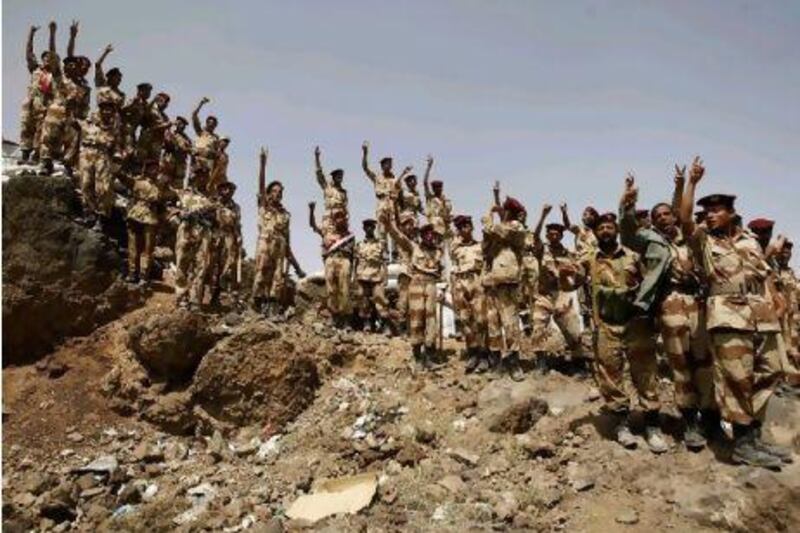Sana'a // The government ministries are closed, police stations are empty, gunmen and thugs roam the streets and there is growing concern over who is running the country as the president recovers in a Saudi hospital from an assassination attempt.
As an estimated four million people continued the weekly pro-democracy protests yesterday in towns and cities across Yemen, many here fear that the political stalemate is causing lasting damage to the country's infrastructure and security.
Just as worrying for the protesters is that President Ali Abdullah Saleh is still exercising power from his hospital bed through his family, most notably his son, Gen Ahmed Ali Saleh, who commands Yemen's most highly trained troops.
The demonstrators yesterday directed their chants toward the country's vice president, Abdu Rabu Hadi, who was officially placed in charge in Mr Saleh's absence. The crowds called on him to implement reforms and announce the end of the Saleh regime that has ruled for more than 32 years.
But it is the 42-year-old Gen Ahmed who appears to be exercising power. He has deployed thousands of security personnel in Yemen's main cities since the attack on June 3 on Mr Saleh's presidential compound that left him, and several members of his government, injured. The attack came after days of fierce clashes with tribesmen and months of massive protests calling for Mr Saleh to stand down.
Gen Ahmed is prepared to use all necessary options if opposition forces try to take over power in his father's absence, a senior Republican Guards official told The National.
"General Ahmed is in total control and wants to ensure that when his father, President Saleh, comes back to Yemen, the situation stays the same," said the official.
Gen Ahmed is operating from the presidential palace and his father's main office in a military compound in the capital of Sana'a, leaving Mr Hadi to work from his home or his office in the defence ministry, several ruling party and government officials told the Associated Press.
The younger Saleh and his cousins have also defied pressure from the vice president to withdraw their troops from the streets of Sana'a as part of a fragile ceasefire with opposition tribesmen, AP reported.
Since the truce began a week ago, Ahmed has brought more tanks and troops to positions in the capital's Hassaba district near the home of the tribesmen's leader, Sheikh Sadeq al Ahmar, a high-ranking military officer said. "The president's son is following a policy of escalation, as if to say he is the legitimate heir of his father," the officer said.
Gen Ahmed has long been touted as the next ruler of Yemen but many were angered this week when celebrations in Sana'a to mark successful surgery on his father left more than 16 people dead and 230 injured. The celebratory gunfire lasted for five hours on Wednesday night and was blamed on Gen Ahmed.
"He (Ahmed) wanted to show Yemenis that he is powerful and has men and forces in every street. He scared the people and loyalty of the people can never come with fear," said Saleem Mutawakil, 23, a third-year university student in Sanaa.
Officials in the ruling General People Congress party said that the use of ammunition to celebrate was a sign of power from President Saleh's son and nephews, who also hold key military positions.
"Having gunmen shooting in every street of the capital is a message from the ruling family that we exist and are in power," said Zaid Thari, a political adviser to the ruling party.
As the power struggle continues and risks returning to violence, life for people in Sana'a has become increasingly more difficult and dangerous.
Crime rates have increased more than 300 per cent since early May, according to criminal attorney Mohammed Nagi Allow.
"More crimes and attacks have been reported over the last month than ever before," he said. "The ruling family are insisting on degrading the people of Yemen and treating them like slaves and not like citizens who have rights."
He added that people with guns are now ruling the streets in Sana'a as no public services exist and looting is widespread.
Courts have been closed since mid May, while businesses continue to lay off employees.
Yemenis complain that there are few services and access is greatly reduced. Electricity blackouts continue throughout the country.
"How are we supposed to live. No water, no service, no electricity. We can't survive like this," said Fatima Mahfadi, a mother of three.
The government ministries began shutting down at the beginning of June when employees complained it was not safe to work.
Wassem Saleh, who has worked at the defence ministry for six years, said he had not attended work for more than a month fearing he might be killed.
"It's chaotic now, gunmen in almost every street and thugs create checkpoints. My life is more important than my job," he said. "The government has to assure me safety if it wants me to serve it."
Yet despite the hardships, protesters yesterday gathered in almost all of Yemen's 21 provinces for the 19th consecutive on Friday.
More than 100,000 supporters of the president also gathered in Sana'a's Sabeen Square.
* With additional reporting by Associated Press





